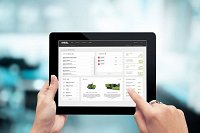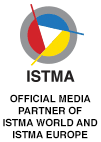Focus on overall efficiency
15.02.2019
With two sophisticated injection moulding applications – the production of LSR lenses on a tie-bar-less ENGEL e-victory and the manufacture of food containers on an all-electric ENGEL e-mac injection moulding machine – the injection moulding machine manufacturer and system solutions provider ENGEL, headquartered in Austria, will be clearly demonstrating at Koplas 2019 from 12th to 16th March in Goyang, South Korea, how low unit costs can be combined with the highest quality requirements. One key factor here is inject 4.0, ENGEL's answer to the challenges of digitalisation and networking. Koplas 2019 is the first trade fair at which ENGEL will be presenting its new customer portal in the Korean language.
 Economical production of sophisticated LED lenses from LSR
Economical production of sophisticated LED lenses from LSR
Liquid silicone rubber (LSR) is becoming increasingly important as a lens material for lighting systems in automobiles, buildings and street lighting. In addition to highly efficient processing in fully automated and rework-free injection moulding, it is the specific material properties that have shifted LSR into the product developer's focus. Like the established thermoplastic lens materials, silicone offers significant weight savings compared to glass. However, LSR is superior to organic polymers in terms of thermal and chemical resistance. On top of this, completely transparent grades for optical applications have a lower yellowing index than thermoplastic lens materials, while at the same time allowing for even greater design freedom.
In order to make the huge potential of this material class tangible, ENGEL is producing LED headlamp lenses at its stand from Dowsil MS-1002 Moldable Silicone, a liquid silicone developed specifically for these applications by Dow Silicones (Wiesbaden, Germany). The heart of the integrated production cell is a tie-bar-less ENGEL e-victory 310/120 injection moulding machine equipped with a two-cavity cold runner mould by ACH-Solution (Fischlham, Austria). A MaxiMix G2 – also by ACH-Solution – is used for LSR metering. An ENGEL viper 40 linear robot takes care of parts handling.
Not only by the complex part geometry, the production of LED lenses places high demands on the processing technology. In general, it is only an automated, rework-free process that makes high-tech products made of LSR profitable. Injection moulding machines with tie-bar-less clamping units are perfectly designed for this. Unimpeded access to the mould area enables particularly efficient automation solutions. The robot can reach the cavities directly from the side without needing to working around interfering edges, thus reducing the handling time. At the same time, the tie-bar-less technology keeps the production cells compact. Since the mould mounting platens can be fully utilised right up to the edge, the high-volume lens mould fits on a comparatively small 120-ton injection moulding machine.
One of the reasons for the tie-bar-less e-victory's accurate reproduction of surface detail is the outstanding parallelism of the mould mounting platens. The patented force divider ensures that the moving platen follows the mould precisely while clamping force is building up and that the force introduced is evenly distributed across the platen surface. Where multi-cavity moulds are used, the parting lines of all cavities experience the same surface pressure, which prevents flash even when processing very low-viscosity liquid silicone rubbers. To guarantee the required precision during injection, the e-victory hybrid machine is equipped with an electric injection unit. In addition, the intelligent iQ weight control assistance system improves process consistency in the application presented at Koplas.
During Koplas, trade fair visitors can be guided through the individual work steps required to start the production cell with AR (Augmented Reality) glasses from AVR Tech Innovations (Fischlham, Austria). In the form of texts, animated objects or short video sequences, the glasses display helpful additional information. In the injection moulding shop of the future,
AR supports even more efficient work and reduces the risk of operating errors.
All-electric, powerful and compact
In a second application, ENGEL is focusing on all-electric drive technology. From injecting, through metering to ejection and compression, all the drives in the ENGEL e-mac are servo-electric. This guarantees the best possible precision and process stability while maximising the effectiveness of the machine as a whole. At Koplas, an ENGEL e-mac 1340/280 with an integrated ENGEL viper 12 linear robot will be demonstrating the high performance of this all-electric series by producing polypropylene food containers in a 6-cavity hot runner mould by Yuil System, South Korea.
The e-mac is always the right choice when high precision and energy efficiency are required, but the cycle times are not less than 6 seconds. The e-mac offers a particularly attractive purchase price for these applications.
With a clamping force of 2,800 kN, the e-mac 280 is the largest model in the series that ENGEL developed with a view to the increasing use of multi-cavity moulds. The machine combines a higher output with more efficiency on a small footprint. Across all sizes, the e‑mac is one of the most compact injection moulding machines in its performance class.
With the CC300 control, the e-mac machine offers complete flexibility in the integration of robots and additional peripherals, as well as the use of intelligent assistance systems from the ENGEL inject 4.0 program.
Step by step to the smart factory
The aim of inject 4.0 is to realise the smart factory, in which production processes continually self-optimise through the networking of production systems; the systematic usage of machine, process and production data; and the deployment of intelligent assistance systems. In this way processors can increase the productivity and quality of their production operations while responding with maximum flexibility to changing requirements.
Today, ENGEL already offers a large number of mature products and solutions for the smart factory providing considerable benefits both individually and as part of a superordinate digitalisation strategy. Thanks to the modular structure of its inject 4.0 program, ENGEL makes getting started with digitalisation very easy for its customers. Intelligent assistance systems such as iQ weight control, which can be seen live during Koplas at ENGEL e-victory, are often the first step. In order to compensate for fluctuations in the raw material and the ambient conditions during the running process, the software analyses the pressure profile during injection of the polymer melt and compares the measured values with a reference cycle. The injection profile, switchover point and the holding pressure profile are adjusted to the current conditions for each individual shot, which keeps the injected volume constant during the entire production run. In this way rejects are proactively prevented. Other assistance systems that ENGEL will be presenting in an Expert Corner during the five days of the fair are iQ clamp control for automatic determination of the optimum clamping force and iQ flow control for dynamically controlled multiple-circuit temperature control.
e-connect customer portal speaks Korean
One special highlight at Koplas is the ENGEL customer portal e-connect, which will be presented in Korean for the first time. At any time and anywhere, it provides an overview of the machine status, the processing status of service and support orders and the prices and availability of spare parts. In this way, the portal simplifies and accelerates communications between processors and ENGEL. All service products from the inject 4.0 program are integrated into e-connect, including e-connect.monitor for condition-based predictive maintenance and e-connect.24 for 24/7 online support.
On site with the processors
ENGEL has been present in Asia with its own subsidiaries for more than 30 years. Customer proximity ensures a deep understanding of local requirements, fast on-site service and short delivery times. In 2001 a production plant for small and medium clamping force injection moulding machines was opened in Pyungtaek City, South Korea. ENGEL large-scale machines have been built in Shanghai, China, since 2007. Both plants produce for the needs of customers in Asia.


































